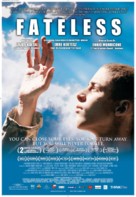Reviews provided by RottenTomatoes
Michael Wilmington, Chicago Tribune: The film is on a level just slightly below Schindler's List and The Pianist, and only because Koltai is a less powerful, practiced director than either Steven Spielberg or Roman Polanski. Read more
Rex Reed, New York Observer: More than just another Holocaust memoir, Fateless is something special: an unforgettable portrait of grief and hope, loss and transcendence. Read more
Ruthe Stein, San Francisco Chronicle: Fateless accomplishes the near impossible, bringing a fresh perspective to a horrific subject about which a multitude of films already have been made. Read more
Eleanor Ringel Gillespie, Atlanta Journal-Constitution: Many of the images in Fateless are familiar, but they're presented so unsparingly, so uncloaked by emotion, they become freshly potent. Read more
Noel Murray, AV Club: Fateless presumes audiences know the details of how European Jews moved from ghettos to camps to liberation, so Koltai frequently jumps right past the big changes, and dwells instead on the tedious hours inside the train on the way to Auschwitz, an Read more
Kerry Lengel, Arizona Republic: A reflection of how its main character comes to experience reality, as one small moment between what came before and whatever horror or happiness is yet to come. Read more
Ty Burr, Boston Globe: Fateless looks man's inhumanity to man square in the eye and pronounces it standard operating procedure, and that may be the greater horror. Read more
Kevin Crust, Los Angeles Times: A first-rate contribution to the Holocaust canon. Read more
Bruce Westbrook, Houston Chronicle: Epic in scope and imagery, the film is a haunting look at mankind's capacity for inhumanity, as well as survival. Read more
Peter Rainer, Christian Science Monitor: This is a Holocaust movie that is so relentlessly observed and so aware of woe that it never feels like it belongs to a genre. Read more
Lisa Schwarzbaum, Entertainment Weekly: A disturbingly beautiful film. Read more
John Monaghan, Detroit Free Press: With its first-person approach, Fateless joins other classic films about the Holocaust (Shoah, Schindler's List) by vividly portraying an event that can seem remote as the number of eyewitnesses shrinks each year. Read more
Ella Taylor, L.A. Weekly: ... a remarkably tough-minded debut by Lajos Koltai ... Read more
Marta Barber, Miami Herald: In looking at Gyuri -- you see an indomitable spirit that rises above the horrors of his past. Read more
Gene Seymour, Newsday: As you'd expect from a cinematographer's movie, it's visually striking. But as its ambiguous postwar scenes of its embittered, bewildered hero display, it is also probing beyond its subject's customary parameters for fresh perspective. Read more
Stephen Whitty, Newark Star-Ledger: There's a great movie in Fateless, but it's the second half of a double-feature. And the first feature is one we've seen before. Read more
A.O. Scott, New York Times: Lajos Koltai's film, which follows a Jewish boy from Budapest to Buchenwald, ranks among the best nondocumentary cinematic treatments of the Holocaust yet produced. Read more
Rick Groen, Globe and Mail: Not only do the scenes set during the war develop a cumulative emotional power, but those in the war's immediate aftermath give us a glimpse into a truth seldom explored -- a truth that only a survivor can possess. Read more
Geoff Pevere, Toronto Star: Koltai, a veteran cinematographer whose credits include more than a dozen movies by Istvan Szabo (Mephisto, Sunshine), has managed something near miraculous with this hypnotically paced, lyrically downbeat, weirdly dreamlike 140-minute movie. Read more
Trevor Johnston, Time Out: Relatively few films touching on the Holocaust are worthy of their subject; this one is. Read more
J. Hoberman, Village Voice: Fateless will be inevitably compared to Schindler's List and especially The Pianist; while no single scene is as harrowing as the strongest moments in either of those movies, it's more sustained than either. Read more
Ann Hornaday, Washington Post: Fateless is an extraordinary film, not just for its harrowing attention to detail of life within the concentration camps, but for the equal place of privilege it gives to life before and after World War II. Read more

